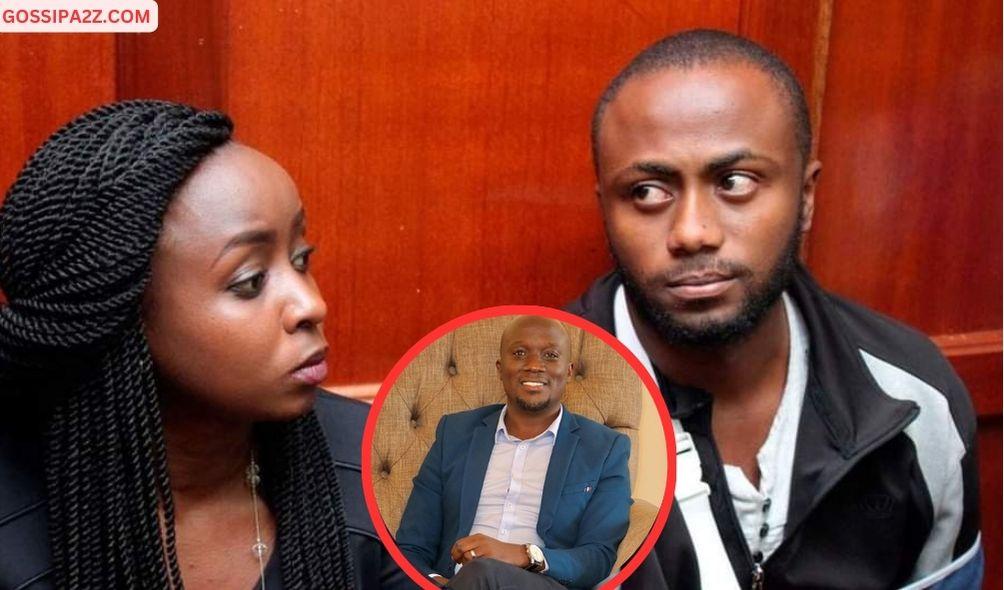Dennis Onsarigo Uncovers 5 Shocking Discrepancies in Jowie Irungu’s Conviction
Dennis Onsarigo, a former investigative journalist, has shared his perspective on the verdict which determined Joseph Irungu, also known as Jowie, to be guilty of the murder of businesswoman Monicah Kimani.
In the decision delivered on Friday, February 9, Justice Grace Nzioka cleared former Citizen TV anchor Jacque Maribe of charges, as she determined that the prosecution had filed incorrect charges against her co-accused.
Onsarigo, who solidified his reputation in the media through his investigative series “Case Files” broadcasted on KTN, cast doubt on the verdict of guilt.
How Jowie Gained Entry into the Apartment
The ex-journalist raised doubts about how Jowie was able to access the apartment in Kilimani using someone else’s identification.
“Jowie arrives at Monicah’s apartment disguised as Dominic Bisera Haron (a resident whose ID went missing two weeks prior). Mind made up, he is allowed into the apartment, not as Jowie but as Haron. Did the guard call Monicah to say “Madam Haron is here, may he come in?” to which Monicah replied “Give him the phone, I talk to him” only to find it Jowie and allowed him to come up?” he posed.
“Or did the guards – assuming one or two were on duty the past few days when Jowie visited – realize he is posing as Haron and just let him in? The ID, did it have Haron’s face? Or was it Haron’s but with Jowie’s mugshot?”
ALSO READ:
- “Two Groups, One Agenda”: Gachagua Accuses Raila of Secret Political Deals
- Exclusive: Ida Odinga’s 75th Birthday Party in Karen (Photos)
- FKF President Discloses Exact Amount Paid to Harambee Stars Players
- Gachagua’s Ally Senator John Methu Admits Ruto Might Win 2027 Elections
- Maraga Explains Why He Hasn’t Campaigned in Kisii Despite 2027 Bid
Nevertheless, the court determined that the deliberate theft of the ID card and its subsequent use on the specified day indicated a premeditated scheme.
“The question that arises whether the first accused stole the ID card or it is by coincidence that the card was stolen from the estate where he was staying and was later used at the apartment by a person wearing the same clothes inter alia; a maroon cap, white kanzu which witnesses testify were the same clothes the first accused was wearing,” read part of the ruling.
The Presence of Two Other Men
Additionally, Onsarigo highlighted that Monicah permitted Jowie to enter the apartment, even though she was in the company of other men.
He pondered if an individual driven by a motive for murder would take the chance of being recognized by others.
Onsarigo stated that this would have posed a risk to his prospects, as the other individuals could easily identify him as the last individual seen with the deceased.
In the court ruling issued by Justice Nzioka, the judge stated that Jowie was the last person seen with Monicah. She cited The Doctrine of Last Seen which states, “The person who is last seen in the company of another who is later found dead, is called upon to explain the circumstances under which the deceased met his or her death.”
Monicah Doesn’t Show Any Signs That She is in Josie’s Presence
Onsarigo pointed out that the men engaged in socializing at the apartment, where Jowie entertained them with amusing jokes about the nation’s data system. Shortly afterward, the remaining individuals departed from the apartment.
Ten Minutes Timeframe
The ex-journalist pondered how the entire scheme could unfold in just ten minutes, a query also raised by Jowie’s defense team.
Jowie’s attorney questioned the feasibility of his ability to restrain Monicah, guide her to the bathroom, arrange candles around the bathtub, and subsequently cut her throat from one ear to the other.
“Not a single drop on his kanzu, no resistance, he walks out of the house exactly after ten minutes, walks past the nightguards but not before telling them “goodbye soldiers.”
Justice Nzioka challenged the accuracy of the ten-minute duration, pointing out an error in the recording of Jowie’s entry and exit time by the guard.
The prosecution emphasized the Kanzu aspect, contending that Jowie brought additional clothing, specifically a white Kanzu that he put on before visiting the victim’s residence and subsequently changing attire. This was presented as evidence suggesting a motive for carrying the mentioned clothes to carry out the alleged offense.
DNA Trail
The ex-chief of Staff for Nyamira County also assumed that the ropes utilized to restrain Monicah contained DNA from two additional individuals and Jowie. This raised concerns about why the judge did not thoroughly investigate this evidence.
Onsarigo stated that, instead, the judge pointed out that the accused had been charged with participating in the offense in collaboration with others.
In any case, the DNA of the two men was not found on the body of Monicah and thus did not connect them to the murder!”
“The judge agreed with him that indeed the DNA belonged to two other people and that is why he was charged before a court of law as having murdered with ‘other people before the court’,” Onsarigo pointed out.
“Jowie’s DNA was not found on Monicah’s body and this gets me thinking what if his DNA was found on a glass in the house? Could the judge have said he is innocent because it wasn’t discovered on her remains?” he wondered.
Jowie, whose bond was canceled, is set to be sentenced on March 8, 2024.
Dennis Onsarigo Uncovers 5 Shocking Discrepancies in Jowie Irungu’s Conviction
